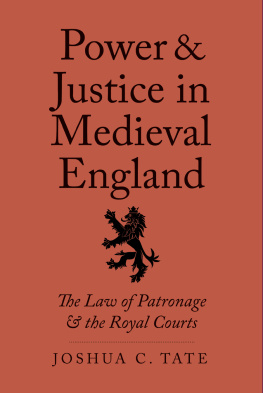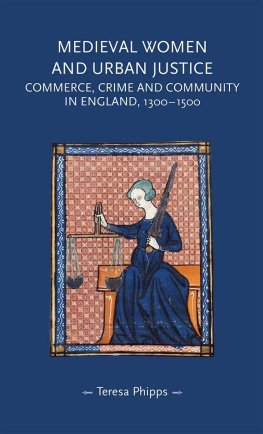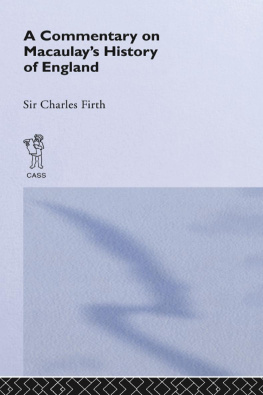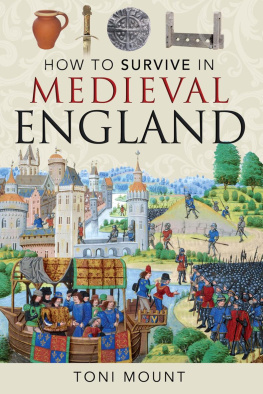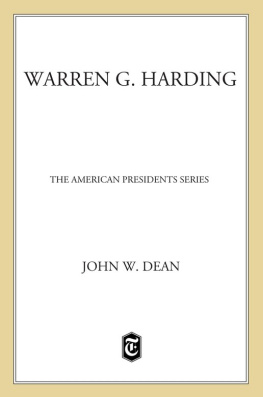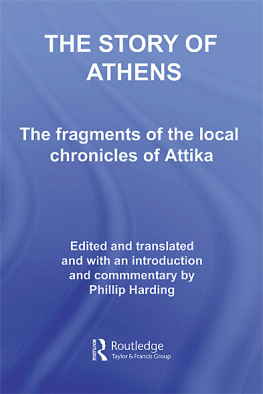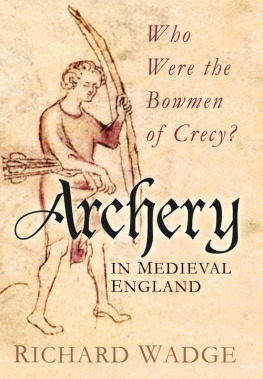ROUTLEDGE LIBRARY EDITIONS: THE MEDIEVAL WORLD
Volume 18
THE LAW COURTS OF MEDIEVAL ENGLAND
THE LAW COURTS OF MEDIEVAL ENGLAND
A. HARDING
First published in 1973 by George Allen & Unwin, Ltd
This edition first published in 2020
by Routledge
2 Park Square, Milton Park, Abingdon, Oxon OX14 4RN
and by Routledge
52 Vanderbilt Avenue, New York, NY 10017
Routledge is an imprint of the Taylor & Francis Group, an informa business
1973 George Allen & Unwin, Ltd
All rights reserved. No part of this book may be reprinted or reproduced or utilised in any form or by any electronic, mechanical, or other means, now known or hereafter invented, including photocopying and recording, or in any information storage or retrieval system, without permission in writing from the publishers.
Trademark notice: Product or corporate names may be trademarks or registered trademarks, and are used only for identification and explanation without intent to infringe.
British Library Cataloguing in Publication Data
A catalogue record for this book is available from the British Library
ISBN: 978-0-367-22090-7 (Set)
ISBN: 978-0-429-27322-3 (Set) (ebk)
ISBN: 978-0-367-20837-0 (Volume 18) (hbk)
ISBN: 978-0-429-26371-2 (Volume 18) (ebk)
Publishers Note
The publisher has gone to great lengths to ensure the quality of this reprint but points out that some imperfections in the original copies may be apparent.
Disclaimer
The publisher has made every effort to trace copyright holders and would welcome correspondence from those they have been unable to trace.
THE LAW COURTS OF MEDIEVAL ENGLAND
Alan Harding
University of Edinburgh
First published 1973
This book is copyright under the Berne Convention. All rights are reserved. Apart from any fair dealing for the purpose of private study, research, criticism or review, as permitted under the Copyright Act, 1956, no part of this publication may be reproduced, stored in a retrieval system, or transmitted, in any form or by any means, electronic, electrical, chemical, mechanical, optical, photocopying, recording or otherwise, without the prior permission of the copyright owner. Enquiries should be addressed to the publishers.
George Allen & Unwin, Ltd
Published in the USA 1973 by
Harper & Rowe Publishers Inc.
Barnes & Noble Import Division
ISBN o 04 942106 9 hardback
o 04 942107 7 paper
Printed in Great Britain
in 10 on 11 point Plantin type
by Alden & Mowbray Ltd
at the Alden Press, Oxford
CONTENTS
In the footnotes to the introduction, the following abbreviations have been used:
EHD English Historical Documents
BIHR Bulletin of the Institute of Historical Research
EHR English Historical Review
TRHS Transactions of the Royal Historical Society.
Documents. As far as possible, these have been ordered chronologically. Where the original language is not specified, a document has been translated from Latin; and if the translator is not named (in capitals) at the head of the document, the translation is my own. Square brackets indicate words supplied, usually by the original editor but sometimes by myself, in order to make damaged, illegible or elliptical passages in the document intelligible. For the same purpose, I have taken the liberty of modernizing the spelling and occasionally the language of the few late medieval documents in English, and of supplying a necessary minimum of punctuation.
I wish to thank the following for permission to use their translations: Associated Book Publishers Ltd. for Documents 2,6 and 8, from English Historical Documents, I, ed. Dorothy Whitelock, and English Historical Documents, II, ed. David Douglas and G. W. Greenaway; Cambridge University Press for Document 3, from A. J. Robertson: Anglo-Saxon Charters, 2nd edition 1956 Cambridge University Press; Manchester University Press for Documents 4 and 5, from F. E. Harmer, Anglo-Saxon Writs; Mr G. D. G. Hall for Document 9, from his edition of Glanvill; Dr Antonia Gransden for Document 16, from her edition of The Chronicle of Bury St Edmunds; and the Seiden Society for Documents 13, 15, 24 and 29, from Select Cases of Procedure without Writ under Henry III, ed. H. G. Richardson and G. O. Sayles, Placita Corone, ed. J. M. Kaye, Select Cases in the Court of Kings Bench, VI, ed. G. O. Sayles, and Select Cases in Exchequer Chamber, ed. Mary Hemmant.
I should also like to thank Mrs Sheila Somerville and Mrs Jennifer Newman for their assistance in the typing of both introduction and documents.
THE BEGINNINGS OF LEGAL PROCEDURE
IN origin, courts may be said to have had two functions: first, the maintenance of social peace by the settlement of disputes between individuals, and second, the maintenance of the social dominance of the king or noble who held the court. Practically the two are inseparable, but logically the maintenance of social peace must come first, for society can hardly be said to exist without a means of settling disputes peacefully, while kings and princes are products of society. Kings, princes, and also priests, come onto the scene as the chosen arbiters of society and the enforcers of societys sanctions against disruptive elements.
There were procedures for settling conflicts before there were courts in any formal sense. Until there were legal ways of obtaining compensation for the minor damage which men inevitably do to one another in the various transactions of a reasonably developed society, disputes must often have led to killing and blood-feud. The feud was certainly accepted as a normal thing up to the Norman Conquest and beyond,
The settlement of feuds by arbitration at which Njal was so expert in Iceland took place in regular assemblies of the people, but evidence that the Anglo-Saxons likewise came together in folk-moots for judicial purposes is very scanty.
So the Old English laws are concerned not with the procedure of trial in court, but with how pressure is put on a man to submit to a peaceful settlement - a matter of formalized threat and siege and riding to and fro. This was the beginning of legal procedure, and a considerable part of it has always remained this pressure before the court hearing - which may make that hearing unnecessary.
THE OWNERS OF THE COURTS
The injured man, out for revenge, provided one of the two necessary elements of this procedure: the unremitting pressure. The other element - control, restraint, delay while tempers cooled - had to be provided by the man with political or moral power, the lord or the cleric, the person whose function it was to keep the peace. The function soon became a right, a possession, almost an object or substance: the peace or





